| |
Submitted by Moshe-Yudel Arkin's Descendants
Moshe-Yudel, son of Shmuel Arkin, was born around 1860 (presumably in
Lunna). He married Chana, daughter of Shmuel Osher Marshak. They had three
sons and three daughters: Arye-Leib (Leon, b. ca. 1889), Mattus (Mathew, b. ca. 1890), and
Aaron (b. ca. 1892); Ester-Etl (b. ca. 1886), Zina
(b. ca. 1887), and Asna (b.1894). All the children were born in Lunna. The family of
Moshe-Yudel Arkin was the richest family in Lunna in the 19th century.
They controlled the wood trade, and sent rafts of wood down the Niemen
River to Prussia. They resided in a two-story house at the
marketplace. One of their relative was Aaron Liberman (b. 1845 in
Lunna) who later founded the Jewish Socialist Movement and was the
most famous person to come from Lunna. Moshe-Yudel Arkin died in Lunna
on June 20, 1929 and was buried in the Lunna cemetery. After his
death his wife Chana moved to Grodno. She used to visit Lunna
during holidays. Chana perished in the Holocaust.
|
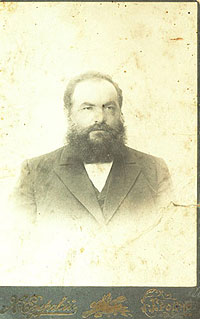
|
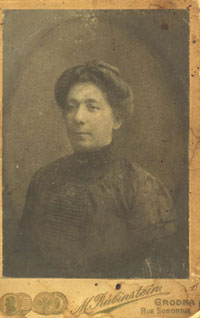
|
|
|
Moshe-Yudel Arkin (ca. 1910)
(collection: Marc Nussinov
(Moshe-Yudel's grandson)) |
|
|
Chana (Marshak) Arkin (ca. 1910)
(collection: Marc Nussinov
(Chana Arkin's grandson)) |
|
|
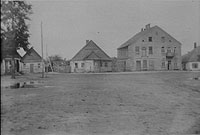
|
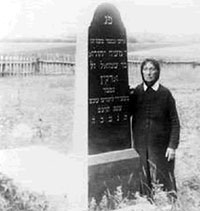
|
|
|
Moshe Yudel Arkin's home (right, two-story with balcony, in the
marketplace (ca. 1920s)
(Source: Yivo Institute for Jewish Research) |
|
|
Chana Arkin at her husband Moshe-Yudel's gravestone
Lunna cemetery (ca. 1930)
(Source:
http://www.eilatgordinlevitan.com/grodno/gr_pages/gr_portraits.html
[#grd-p-2]. Notice that Moshe-Yudel Arkin was buried in Lunna
cemetery, Grodno district and not in Grodno city cemetery.) |
|
The Children of Moshe-Yudel and Chana Arkin
1. Arye-Leib (b. ca. 1889 in Lunna) left Lunna for the US,arriving
at Ellis Island in 1905. He was known in the US as Leon Arkin. He
married Adele (b. ca. 1889). Leon was associated with the Jewish Daily
Forward, first in Boston and then in New York. He was also elected and
served as National President of the Workmen's Circle, a Jewish
fraternal organization. One of his essays entitled "I saw again my
shtetl Lunna" was published in the Forward on June 17, 1949 and is
posted on the memoirs page . Leon and Adele
Arkin had two daughters, Ethel (b. ca.1909) and Mildred (b. ca. 1913),
who grew up in Boston. Ethel Dena married Jacob Charles Bergen;
Mildred married Basil Feinberg. Leon Arkin died in 1953 and Adele
died in 1978. Ethel and Jacob Bergen died in 1992. Mildred Feinberg
died in 2002. Their families live in the United States.
|
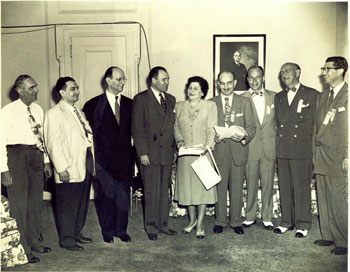
|
|
|
Leon Arkin (third from the left), Philadelphia, circa. 1946 - 1948
(collection: Marshall Bergen (Leon Arkin's grandson))
Note: It is likely that Leon Arkin was a representative of the
newspaper, The Forward, with a union such as the Garment Workers
Union.
|
|
2. Mattus (Mathew), along with his brother Leon, moved to the United States in 1905.
They both belonged to the Bund Party, and emigrated after the Russian
Revolution was defeated in 1905. In the US, Mathew lived in Wheeling,
West Virginia. He married May Levin and they had a son Samuel (b.
1918) and a daughter Rosalind. Samuel was in the auto parts business
in Pittsburgh, Pennsylvania. Mathew died in 1956. Samuel died in 2003.
His sister, Rosalind, died in 1982. Their families live in the United States.
Below are three photos from the collection of Andrea Arkin (Samuel
Arkin's granddaughter). The photos were taken in America around 1948.
|
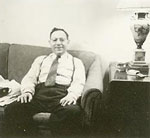
|

|
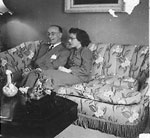
|
|
|
Mathew Arkin (1948) |
|
|
Mathew & May Arkin with their daughter Rosalyn |
|
|
Samuel Arkin (Mathew's son) & his wife Anita |
|
3. Aaron Arkin married Luba Abramski. They had two sons. The name of
the older son is currently unknown; the younger son was named Shmuel (b.
1923). In 1930, after Moshe-Yudel passed away, they moved to Grodno
together with Chana Arkin (Aaron's mother). Luba died in Grodno before
the war. During the war Aaron Arkin, his younger son and his
mother Chana Arkin, were in the Grodno Ghetto. They perished in the
Holocaust. The list of Auschwitz victims includes the name of
Shmuel Arkin, born on June 3, 1923 to Aaron and Luba Arkin, and who died
in Auschwitz on March 24, 1941. The older son of Aaron (Saul?) served
in the Red Army and was killed during the first battle between the
Russians and the Germans in June 1941.
|
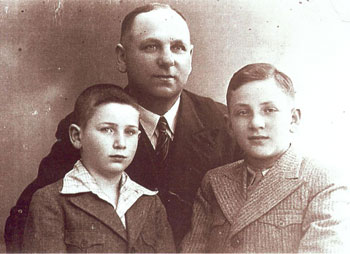
|
|
|
Aaron Arkin & his two sons
(collection: Meira Zinger (Etl Arkin-Belous'
granddaughter)) |
|
4. Ester-Etl (Arkin) married Meir Belous and moved to Bialystok. Meir
was a leather merchant. He died in 1940. Etl was a potato merchant in
Bialystok. Meir and Etl Belous had four children, born in Bialystok:
Mina (b. 1905), Miriam (b. 1907), Eliyahu (b. 1910), and Rachel (b.
1914). Eliyahu Belous left Poland in 1929 and settled in Haifa. A few
years later, Rachel Belous left Poland for Eretz Israel, married
Dromi, and lived in Tel Aviv. Their families live in Israel. Mina
married Israel Liberman; they had a son Yitzchak (in Polish: "Yazhi").
Miriam was a physician in Bialystok. She was married but the name of her
husband is currently unknown. Etl Belous, Mina Liberman, and Miriam
perished in the Holocaust.
|
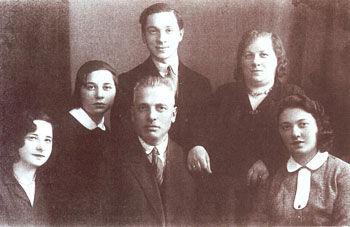
|
|
|
Belous Family (ca. 1927)
Parents: Meir Belous (sitting middle), Etl (Arkin) Belous
(standing behind Meir, to his right). The children (L - R):
Mina/Miriam, Rachel (Belous) Dromi, Eliyahu Belous, Mina/Miriam
(collection: Meira Zinger (Etl Arkin-Belous' granddaughter))
|
|
5. Zina (Arkin) left Lunna and moved to Kiev, Ukraine, sometime after
1916. She was married to Adolf. They both died sometime between the 1950s and
1960s.
6. Asna (Arkin) was born in 1894 in Lunna and educated in a special women's
gymnasium in Grodno. In 1916, during World War I, Asna volunteered as a nurse
in the special medical division of the Russian army and retreated with
the army to Kiev (Ukraine). In 1918 she married David Girsh Chaimowicz
Nussinov. They had two children: Marc (b. 1925) and Judith (b. 1930).
In 1941, when the German Army arrived in Kiev, the family was evacuated
first to the Caucasus and then to Kazakhstan, where they lived until
the end of World War II in 1945. They then lived in Moscow.
After the war, in December 1946, Asna and her brother Leon Arkin had a
first telephone conversation from Moscow to Boston. In this
conversation, Asna told her brother Leon what happened to their family
during the Holocaust. Leon Arkin wrote a weekly column in the Forward
describing this conversation (see below).
Asna and her husband died in Moscow between 1984 and 1985. Marc
and his wife Anna left Moscow and immigrated to Israel in 1992. They
have a daughter Elena, who lives with her husband in Belgium. Judith
and her family live in Moscow.
|
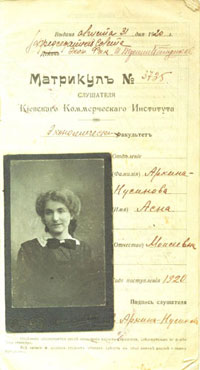
|
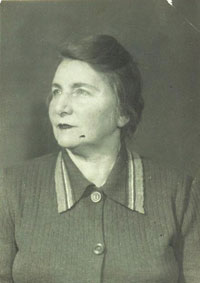
|
|
|
Asna (Arkin) Nussinov
Matriculation: Kiev Commercial Institute
(1920)
(photographer: M. Rubinstein, Grodno, circa. 1919)
(collection: Marc Nussinov (Asna's son)) |
|
|
Asna (Arkin) Nussinov
(Moscow, ca. 1955)
(collection: Marc Nussinov (Asna's son)) |
|
Below is a weekly column in the Forward written by Leon Arkin
describing his first conversation with his sister Asna (Arkin)
Nussinov.
Dec. 22, 1946
In and Around Boston
|
Weekly Overview
A conversation by telephone from Boston to Moscow -
Personal experience and surprise -
What happened to a great family -
I seek now the day of Yahrzeit
by Leon Arkin
|
Several days ago I spoke, by telephone, from Boston to Moscow (Soviet
Russia). I want to say right from the beginning that I spoke not as a
"Forward" correspondent by telephone to Joseph Stalin, or any other
important official of the Kremlin, but I, as an individual, as a
single person, spoke by telephone to a sister of mine, who lives now
in Moscow [Asna Nussinov]. It was the conversation of a brother to a
sister.
The readers of my weekly column will excuse me that instead of writing
about city events, I shall today take up personal experiences, with
the surprises, and with the regrets which a person can have, when a
brother has a conversation with a sister, with whom he has not seen
for the last 42 years and whose voice he has not heard in the course
of many years.
This happened several days ago, and I want to share with the readers
of my weekly column my personal experiences, my impressions.
My conversation by telephone from Boston to Moscow was a mixture of
joy and sorrow. It was a joy that for the first time since I left my
home and said goodbye to my little sister that I had the opportunity
to speak to her and hear her voice. At the same time our conversation
was transformed into one of great sadness when I found out from her
what happened to our family in the course of the war years, from the
"Nazi" occupation.
I feel that I have a strong character. Sentimentality does not move
me. I know that I am not the only person in the world, who left his
family in the last Jewish tragedy. I know that among the six million
perished Jews, are found many relatives and friends of the "Forward"
readers. Everyone hopes, however, that their relatives will still be
found; one has the hopes, truthful or false hopes, yet one hopes -
perhaps one will yet hear from them.
I also had these same false hopes. I had hoped the entire time that I
would yet have greetings from my most beloved dearest ones. The
telephone conversation from Moscow extinguished all my expectations
forever. I am now completely convinced that I will never ever see my
mother, my brother and sister and their children, nor even hear from
them. They can no longer be found among the living. Thus my little
sister had let me know by telephone from Moscow in the conversation
which I had with her several days ago. I call her my little sister
because when I left my home, she was not more that 6 or 7 years old.
That occurred in 1905. I was not more than 16 years old. Because of
revolutionary activity I had to leave my rich home, leaving behind in
the Grodno province [in Lunna] my father, who was a great wood
merchant; my mother, who was considered in our region for beauty and
wisdom, also two older sisters than me, two younger brothers and a
small sister.
With the exception of my youngest brother who came to America and who
lives now in Holiday's Cove, West Virginia, I had not seen nor spoken
to the family since I abandoned my home 42 years ago.
My learned and intelligent father died in the beginning of 1929,
before Hitler came into power. In Europe my mother, my brother and his
family, and three married sisters and their families were living at
that time.
Until the Second World War broke out, I used to correspond with them.
After that, when Hitler seized the region where they lived, I heard
from them no more. Two of my sisters, I knew, lived in Kiev. What
happened to my whole family, I don't know. I made many attempts to
find something about them, but all my attempts were without success.
On Friday, two weeks ago, the sixth of December, I received a telegram
from Moscow from my youngest sister who let me know that her family
was alive, and her husband had suddenly become sick and she asks me to
help her. Just as I received the telegram (cable), I thought there was
a ray of hope. I hoped that not only my little sister and her family
were saved and remained alive, but also the remaining members of my
family - my old mother, my brother - would be found among the living.
I imagined in my fantasy that I would yet have the opportunity to meet
with my mother, who did not want to come to America, because she had
wanted to lie near father's grave. My father and mother had deeply
loved each other during their life together; my mother had the desire
that after her death she would be buried near my father. At my
father's grave, I had put up marble monument, and it was her desire
that also such a monument should be placed over her grave.
When I received the telegram from my sister, I decided that if my
mother lives, I would try to convince her to come to America and spend
her remaining years with me in my house where she would be treated
with honor. My wife and I had already made plans how to arrange for
her, that in her last years she should forget the horrible experiences
from the war years.
I became impatient; I wanted to know as quickly as possible the fate
of my dearest ones. But how does one do this? How can one quickly find
out all the particulars? I remembered that a short time back I read in
the papers that a telephone connection was instituted between America
and Russia, that one would now be able to speak by telephone from
Boston to Moscow, and I decided to call up my little sister by
telephone and she would give me the information what I was so eager to
know,
I had just connected to the "overseas" operator and asked that I
should be connected by telephone with my sister in Moscow, giving my
sister's address.
I waited for eight days until I had the opportunity to speak with her.
Several times I was let known that the circuit to Moscow was out of
order and wasn't working. I was also asked, of which language I would
want to speak to her. Finally on the eighth day, eleven o'clock in the
morning, I was informed that I could speak with my sister.
Our conversation was as follows:
- Sister.
- Brother, dearest one.
- How are you?
- I am well, but my husband is very sick.
- Do you still remember me? I left you behind when you were a small
girl.
- Certainly I remember you, my brother!
- Where is mother?
I receive no answer, and I pose the question again.
- Where is mother?
With a cry in her voice I hear the following answer:
- Mother died in the Grodno Ghetto.
- What became of our brother?
- He with his family was killed in concentration camps.
- What about our oldest sister with her family?
- Her husband died in Bialystok, she with her children were killed in
concentration camps.
- Which day do we have Yahrzeit for mother and our relatives?
- I don't know.
- How can I help you? Should I send you money or packages?
- Send me packages, send me clothes and shoes. We need winter clothes.
- I don't know your measurements for the clothes.
- Send me clothes which we'll sew here.
- What else can I do for you?
- I want you to bring me to America for a visit, my brother.
- That is impossible.
- How is Mathew? (my brother in America).
- He is well.
- Brother of mine, you and Mathew are the only ones with whom I am
connected to in this world.
Here the telephone operator interrupted that the conversation is
already too long, and I had to say to her:
- Be well, my little sister.
- Brother of mine!
With that ended the telephone conversation from Boston to Moscow.
Her last words, "brother of mine", which I heard, were pronounced with
so much heart, that as long as I will live, in my ears will ring her
voice with the words "brother of mine."
From the short telephone conversation I found out about the entire
fate of my family. In spite of the fact it was a little hard to hear,
yet I was able to hear exactly the sorrowful news.
That was the end of a conversation with a sister whom I had not seen
in 42 years. Neither of us, I in Boston nor she in Moscow, wanted to
put the receiver down. We both wanted to speak on and on, but the
conversation had to come to an end. It ended my dream and fantasy to
bring my mother to America. She is no longer among the living. Killed
by the Nazi beasts are also my brother and sisters with their
families. There remains for me now only one matter – to find out when
I have Yahrzeit for them.
(Translated into English by Marshall Bergen, a grandson of Leon Arkin)
Other Arkin Families of Lunna
|
Moshe Arkin and Simcha Arkin were two brothers (the name of their father
is unknown) who resided in Lunna at the same time as Moshe-Yudel Arkin.
However, it is currently unknown whether these two brothers were
related to Moshe-Yudel Arkin.
Moshe Arkin (b. ca. 1858) married around 1885 to Gittel. They had a
son Laizer (Eliezer) and a daughter Sheine. They were next door
neighbors of Moshe-Yudel and Chana Arkin who resided in a large
dual-family home. Moshe Arkin was a salesman. In one of his travels
around 1921 he was murdered by a peasant. He was buried in the Lunna
cemetery.
Simcha Arkin (b. ca. 1860 in Lunna) married Henie-Leah (b. ca. 1864 in
Lunna?). He was a shop owner. Simcha and Henie-Leah Arkin had six
children, all born in Lunna. They were (in order of age): Devorah (b.
1883), Zisel (b. 1884), Eliezer (b. 1885), Elka (1886), Necha (b.
1888), and Avraham (b. 1891). Simcha Arkin died in 1893 in Lunna.
Around 1900, Henie-Leah Arkin remarried to Yaakov Rubinov and they had
seven children. Henie-Leah died in Lunna in 1927.
|
The Children of Simcha and Henie-Leah Arkin
1. Devorah (b. 1883) married in 1903 to Yaakov Abin (b. 1880 in Lunna),
son of Sender. Yaakov Abin was a forester. He and his wife Devorah
were also shop owners in Lunna. They had 4 children, born in Lunna:
Frida Abin (b. 1905), married Yaakov Maizel (b. 1903 in Lunna); Simon
Abin (b. 1906), married Nadya Arik; Tzipora Abin (b. 1910), married
Gershon Feldlit; and Yael Abin (b. 1917), married Shabtai Fonorov.
Devorah and Yaakov Abin, Frida and Yaakov Maizel perished in the
Holocaust.
Simon, Tzipora and Yael Abin left Lunna before the Second World War.
They have families in Argentina and in Israel.
2. Zisel (b. 1884) married a person whose name is unknown and moved to
the United States.
3. Eliezer (b. 1885) married Dora. They had two children: Simcha (b.
1905 in Lunna), married Chasya Ivanitsky and Avraham (b. 1908 in
Bialystok), married Zina. Their families live in Israel.
4. Elka (b. 1886) married Yaakov Welbel (b. 1882 in Lunna). They were
grain merchants. They had three daughters, born in Lunna: Rachel (b.
1906) who married Mordechai Kuperfenig, Miriam (b. 1910) who married
Mordechai Rutenberg and Liza (b. 1914) who married Yehoshua Shewtz.
More information is posted on the Family Albums/Welbel page on this
site.
5. Necha (b. 1888) married in 1914 to Nisan Zlotoyabko (b. 1877 in
Lunna). They moved to Bialystok and owned a stationary shop. They had
three children, born in Bialystok: Aliza (b. 1915), married
Elchanan-Dov (Arik) Ari; Shmuel (b. 1922), and Meir (b. 1926).
6. Avraham (b. 1891) married Helena (b. 1892). They lived in Bialystok
before World War II and had one child. Avraham was a clerk and Helena was a
German teacher.
Avraham died before the war and Helena perished in the Holocaust.
Note: More details on the family tree of Simcha and Henie-Leah Arkin
are with the family.
Below are two paragraphs of an article (in Yiddish) which appeared in
a book by Samuel Leib Zitron, called Dray Literarishe Doyres (Three
Literary Generations), 2nd volume, published in Warsaw in 1924.
Translation into English was done by Marshall Bergen, a great-grandson
of Moshe-Yudel Arkin.
The Arkin Family
Close by the Niemen River surrounded by thick pine forests in Grodno
Gubernia lies a small shtetl with the name of Lunna. In the 60's of the past
century (1800's), this shtetl was renowned in all of Lithuania because
of the "Arkins", who lived there. There were three brothers, pious G-d
fearing Jews, forest merchants, who had a tremendous wood business
with Prussia, and because of this they became very rich. Almost all
Lunner Jews got their livelihood from the "Arkins". Some were wood
brokers for the Arkins, some were hired to prepare the wood and logs,
others watched over their wood at the shore of the Niemen, others
traveled on the rafts to outside the country, and others simply hung
around and, once in a while, earned a little something. It resulted,
therefore, that the entire Lunner Jewish population felt dependent on
the Arkins who had the greatest influence on all community matters.
Without the Arkins, no rabbi for the town was decided and no butcher
and no cantor and no other person who held a religious post. Without
the Arkins the shtetl did nothing.
It happened that in Lunna the rabbi died, and it was necessary to find
a new one. The Arkins sought out from somewhere a relative, a weakling
and a great scholar, brought him to Lunna and made him rabbi. He was a
greasy fellow, very naïve and very impractical, completely
unmaterialistic and totally absorbed in piousness and religious
matters. Soon he was considered in the shtetl a sort of holy Jew whose
praying was welcomed "above" in the heavenly kingdom. It did not last
a long time, and Reb Itzele - that was his name- became renowned not
only in Lunna, but also in the whole area. From the entire region,
people used to come to him with requests to pray for dangerously ill
relatives, for barrenness, and simply requests of mercy for this or
that one who had serious problems.
This Reb Itzele had brought to Lunna a wife with three grown-up
daughters, who were all of marriageable age, but up to now no
volunteers had been found. However, in Lunna the oldest soon found her
mate. "The Lord himself had him brought to me in my house!" Reb Itzele
said, when on a certain day a young boy came, a student from the town
yeshiva, to ask of the rabbi about a Talmudic question. The boy, an
orphan, without father and mother, originally from Pilvishok, Suvalki
Gubernia, traveled from town to town since the age of 15, came to
Lunna, received bed and board, and entered the Yeshiva. Since the
rabbi had spoken to the Pilvishoker yeshiva student about studying, he
realized that here was a good student with a brilliant mind, and with
this it suddenly flashed in his mind: Perhaps, this is Tzipore
Feigele's destined one?... He consulted with the Rebetzin, and they
decided that it would be best to consult with their relative, the wife
of one of the Arkins, with whom the boy had bed and board. After
discussing with the "rich lady" the same day, the youth came to her
and announced that he was agreeable to such an arrangement. From this
son-in-law of Reb Itzele, the Lunner rabbi, was born the later founder
of the Jewish Socialist Movement and its first gifted agitator in
Russia - Aaron Samuel Liberman (see below).
Aaron Samuel, Son of Eliezer Dov Liberman
|
Aaron Samuel Liberman was born in Lunna in 1845 to Eliezer Dov
Liberman and Ziporah Feigel, daughter of Reb Itzele [nickname for
Yitzchak/Isaac]. Reb Itzele served as a Rabbi in Lunna sometime
between 1840 and 1855. It is currently unknown who Reb Itzele was.
Eliezer Dov Liberman (b. ca. 1820, Pilvishok, Suvalki Gubernia) is the
orphan boy who came to Lunna when he was fourteen years old [in 1834]. In
one source I found that Eliezer Dov Liberman was a nephew of Rabbi
Eliahu Shik, known as Rabbi Elinka, who served as rabbi Lunna sometime
around 1850. Eliezer Dov Liberman married Ziporah Feigel, daughter of
Reb Itzele, and they had a son - Aaron Samuel Liberman. Eliezer Dov
Liberman was a Russian writer.
For more information about Eliezer Dov
Liberman please see
http://www.jewishencyclopedia.com/view.jsp?artid=400&letter=L
|
Aaron Samuel son of Eliezer Dov Liberman became the founder of the
Jewish Socialist Movement. An item about Aaron Samuel Liberman appears
in the Hebrew Encyclopedia (Vo. 21, pp. 704-705). Aaron Liberman
arrived in America in 1880 and shot himself in the head a few months
later in Syracuse, New York. There he lay until 1934, when his body
was reinterred in the Workmen's Circle Mount Carmel Cemetery in
Queens.
For more information about Aaron Liberman please see:
http://www.history.umd.edu/Faculty/BCooperman/NewCity/Roskies.html
David Roskies, "A Revolution Set in Stone: the Art of Burial" (chapter
7) in The Jewish Search for a Usable Past (Bloomington, 1998): 120-145
A photo of the gravestone of Aaron S. Liberman can be seen at
http://www.findagrave.com/cgi-bin/fg.cgi?page=gr&GSln=Lieberman&GScty=405576&GRid=20537759&
This site is hosted at no cost by JewishGen, Inc., the Home of Jewish
Genealogy. If you have been aided in your research by this site and
wish to further our mission of preserving our history for future
generations, your
JewishGen-erosity is greatly appreciated.
|
Compiled by
Ruth Marcus & Aliza Yonovsky Created
May 2007
Updated by rLb, March 2020
Copyright © 2007 Ruth Marcus
All the photos are presented
by courtesy of the families and are not allowed to be reproduced
without their permission. |
|
|